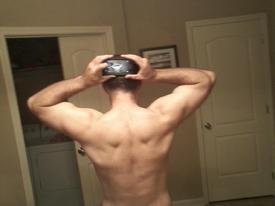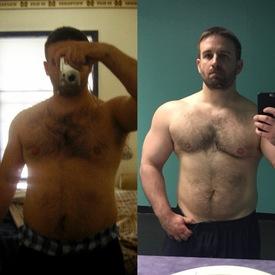Is it possible to burn fat without gaining muscle?

soap_star
Posts: 2 Member
I tend to struggle to do one without the other. I am mixed race and have been told I have around 30% muscle mass which is pretty high for a woman. This is without exercising. When I do exercise I tend to bulk out and not slim down which is not what I am aiming for.
Anyone got any tips on exercises or ways to just burn fat and not gain muscle??
Thanks
Anyone got any tips on exercises or ways to just burn fat and not gain muscle??
Thanks
0
Replies
-
You are probably not 'bulking', but instead losing fat, which leads to the appearance of more muscle. Losing fat will always lead to this.
Of course that's just the most likely situation. You should include your diet and exercise information in detail for a more specific answer.0 -
You're being fed misinformation0
-
-
accidentalpancake wrote: »
I've actually been told similar by two different doctors in relation to race and muscle.
0 -
OP, I'm afraid you may get a lot of comments that won't be too helpful.
To answer your question, yes, that is the only way it is done.
To lose fat, you need to eat less calories than your body uses, i.e. eat in a deficit. In this process, you will lose lean tissues (muscle plus other stuff) as well. To help preserve lean tissue, people try to limit their weekly weight loss based to 2 lbs or less based on the total amount they need to lose.
To bulk up on muscle mass, you need to do strength training and at least eat the same about of calories as you body uses.
If you want to lose fat but not gain muscle, eat in a deficit and don't do strength training.0 -
If you are eating an amount of calories that allows you to lose weight, you cannot also be eating enough calories to gain muscle mass. As a previous poster explained, you may be revealing existing muscle by losing fat, but you cannot do both. When you lose "weight", you are losing all the things that make up your weight - fat, muscle, and water.0
-
It may be that you think you are getting bigger because your muscle may be retaining water and pushing your fat out giving you a bulky appearance. If you continue eating at a deficit and engage in some resistance training you can eventually get smaller (4-6 weeks).0
-
amyrebeccah wrote: »
Fixed that for you.OP, I'm afraid you may get a lot of comments that won't be too helpful.
To answer your question, yes, that is the only way it is done.
To lose fat, you need to eat less calories than your body uses, i.e. eat in a deficit. In this process, you will lose lean tissues (muscle plus other stuff) as well. To help preserve lean tissue, people try to limit their weekly weight loss based to 2 lbs or less based on the total amount they need to lose.
To bulk up on muscle mass, you need to do strength training and at least eat the same about of calories as you body uses.
If you want to lose fat but not gain muscle, eat in a deficit and don't do strength training.
OP, if you lose weight, you will lose fat, water, and some muscle, even if you do strength training. People do strength training to preserve some of their muscle mass, but you can't gain muscle mass on a calorie deficit. It's an incredibly slow and difficult process to do it on maintenance calories, even.
The OP isn't gaining muscle while losing fat, so the only alternative is that she doesn't like the amount of muscle that she already has when the fat melts away. In order to maximize muscle loss while losing weight, she shouldn't do much in the realm of weight training. Cardio is still fine and it would help if she ate less protein as well. Basically the opposite of what most people have to do when trying to KEEP as much muscle as possible.
0 -
Calorie deficit and no resistance training will eventually take care of this. Think of what most long distance runners typically aim for.
The numbers/info you received from whoever told you that seems off though to me.0 -
accidentalpancake wrote: »You are probably not 'bulking', but instead losing fat, which leads to the appearance of more muscle. Losing fat will always lead to this.
Of course that's just the most likely situation. You should include your diet and exercise information in detail for a more specific answer.
Probably this. The muscle you already have is just becoming more visible as your fat percentage goes down.amyrebeccah wrote: »
Fixed that for you.OP, I'm afraid you may get a lot of comments that won't be too helpful.
To answer your question, yes, that is the only way it is done.
To lose fat, you need to eat less calories than your body uses, i.e. eat in a deficit. In this process, you will lose lean tissues (muscle plus other stuff) as well. To help preserve lean tissue, people try to limit their weekly weight loss based to 2 lbs or less based on the total amount they need to lose.
To bulk up on muscle mass, you need to do strength training and at least eat the same about of calories as you body uses.
If you want to lose fat but not gain muscle, eat in a deficit and don't do strength training.
OP, if you lose weight, you will lose fat, water, and some muscle, even if you do strength training. People do strength training to preserve some of their muscle mass, but you can't gain muscle mass on a calorie deficit. It's an incredibly slow and difficult process to do it on maintenance calories, even.
The OP isn't gaining muscle while losing fat, so the only alternative is that she doesn't like the amount of muscle that she already has when the fat melts away. In order to maximize muscle loss while losing weight, she shouldn't do much in the realm of weight training. Cardio is still fine and it would help if she ate less protein as well. Basically the opposite of what most people have to do when trying to KEEP as much muscle as possible.
And to me this sounds about right.
If you don't try to preserve muscle while losing weight, you will also lose muscle during your weightloss.
0 -
1) Calorie deficit
2) Minimal protein
3) Cardio or no exercise at all
4) Wheelchairs, couches and beds are your friends0 -
amyrebeccah wrote: »
Fixed that for you.OP, I'm afraid you may get a lot of comments that won't be too helpful.
To answer your question, yes, that is the only way it is done.
To lose fat, you need to eat less calories than your body uses, i.e. eat in a deficit. In this process, you will lose lean tissues (muscle plus other stuff) as well. To help preserve lean tissue, people try to limit their weekly weight loss based to 2 lbs or less based on the total amount they need to lose.
To bulk up on muscle mass, you need to do strength training and at least eat the same about of calories as you body uses.
If you want to lose fat but not gain muscle, eat in a deficit and don't do strength training.
OP, if you lose weight, you will lose fat, water, and some muscle, even if you do strength training. People do strength training to preserve some of their muscle mass, but you can't gain muscle mass on a calorie deficit. It's an incredibly slow and difficult process to do it on maintenance calories, even.
The OP isn't gaining muscle while losing fat, so the only alternative is that she doesn't like the amount of muscle that she already has when the fat melts away. In order to maximize muscle loss while losing weight, she shouldn't do much in the realm of weight training. Cardio is still fine and it would help if she ate less protein as well. Basically the opposite of what most people have to do when trying to KEEP as much muscle as possible.
Except losing muscle is very unhealthy and wreaks havoc on one's metabolism. By losing muscle it will be that much harder for her to lose fat, and that much easier to put the fat back on.
0 -
It may be that you think you are getting bigger because your muscle may be retaining water and pushing your fat out giving you a bulky appearance. If you continue eating at a deficit and engage in some resistance training you can eventually get smaller (4-6 weeks).
Agreed.
As for the 30% muscle figure, who knows if it's right or not. A quick search shows that average muscle % is 36% for females so 30% is possible but not a high amount.
Most of the articles I found cited the following for the 36% number:
Marieb, EN; Hoehn, Katja (2010). Human Anatomy & Physiology (8th ed.). San Francisco: Benjamin Cummings. p. 312.0 -
if you are eating to lose weight, you cannot bulk...as has been stated, you are revealing muscle that you already have by cutting the fat.
If you are unhappy with the muscle mass you have, lower your protein intake, and do cardio only. I have a friend who was a body builder turned cyclist...he dropped a ton of weight and had to burn a ton of muscle to get where he wanted to be...it took him a couple of years to get there.0 -
Thanks. I do tend to eat a lot of protein so I will take all your comments on board!0
This discussion has been closed.
Categories
- All Categories
- 1.4M Health, Wellness and Goals
- 398.2K Introduce Yourself
- 44.7K Getting Started
- 261K Health and Weight Loss
- 176.4K Food and Nutrition
- 47.7K Recipes
- 233K Fitness and Exercise
- 462 Sleep, Mindfulness and Overall Wellness
- 6.5K Goal: Maintaining Weight
- 8.7K Goal: Gaining Weight and Body Building
- 153.5K Motivation and Support
- 8.4K Challenges
- 1.4K Debate Club
- 96.5K Chit-Chat
- 2.6K Fun and Games
- 4.8K MyFitnessPal Information
- 12 News and Announcements
- 21 MyFitnessPal Academy
- 1.6K Feature Suggestions and Ideas
- 3.2K MyFitnessPal Tech Support Questions












